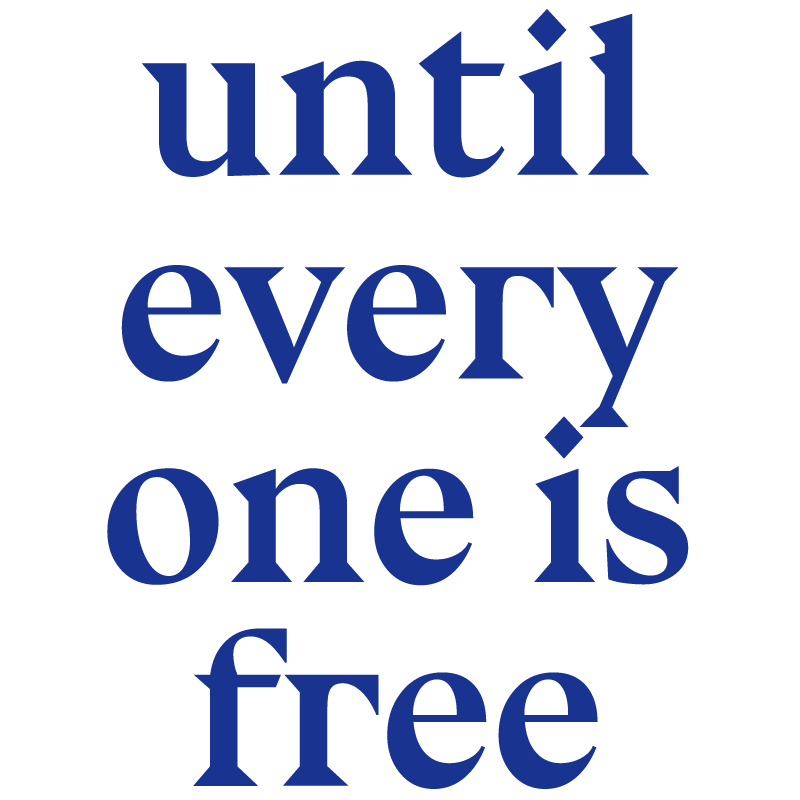About This Project
Stoneface Bombaa (Huduma Namba names Brian Otieno) is a community organizer at the Mathare Social Justice Centre (MSJC), where he runs the MSJC Kids Club and Art for Social Change. He is also a member of the Mathare Green Movement (MGM), a group of volunteers who, through planting trees throughout the informal settlement, practice collective imagination and action.
His work at MSJC and MGM have given him a clear view of the “ecological injustice” that permeates life in Nairobi’s ghettos: exclusion from basic infrastructure like water, roads, electricity, exclusion from healthcare, exclusion from education, and so on. Stoneface has spent time helping young people in Mathare understand the systemic nature of the everyday violence that shapes their lives. Until Everyone Is Free is an extension of that work.
April Zhu is a freelance journalist based in Nairobi, where she has written on gender, urban inequality, and China-Kenya as seen from the margin. While interviewing Stoneface for pieces on police brutality in Nairobi’s ghettos for The New York Review of Books Daily and The Baffler Magazine, a theme kept emerging in their conversations: archiving forgotten histories of resistance in Kenya.
One day, after meeting at the PALIAct Ukombozi Library in town, the two walked down Murang’a Road to City Park Cemetery, where Pio Gama Pinto is buried. They read his headstone: Pio Gama Pinto. Born 31 March 1927. Assassinated 24 February 1965. Socialist and freedom fighter. If he has been extinguished, yet there arise a thousand beacons from the spark he bore.
In the spirit of archiving forgotten histories, Stoneface and April decided to create a radio story about Pinto: to raise more beacons from the spark he bore.
But, with the support of many well-wishers who contributed their skills and time, what began as a small proof of concept grew into a full-length series. This project was a labor of love, made by volunteers, independent of any organization and without any sponsorship. So we must take the time to thank the village that raised it.
Stoneface brought on Felix Omondi—a Sheng translator, filmmaker, poet, and “hood communist” from Mathare—to report sections on modern-day wage exploitation. Felix translated significant portions of the script in Season 1, as well as parts of Season 2, and all of our special episodes.
Later in 2023, Wairimu Gathimba joined our team, working on Season 2 and our special episodes as a researcher, scriptwriter, and co-host. A writer, cultural worker, Kenya Organic Intellectuals Network member, and community organizer at the Mathare Social Justice Centre, Wairimu brought a crucial feminist perspective to the analysis of labour theory at UEIF. Her writing has been featured in The Elephant, This is Africa, and Ukombozi Review, among others.
We could not have created Until Everyone Is Free without the book Pio Gama Pinto: Kenya’s Unsung Martyr (Vita Books, 2018), edited by Shiraz Durrani. Durrani, who fled Kenya in 1984 after being interrogated at Nyayo House for an article he had written about Pinto, did not stop collecting documents and information about Pinto, for almost forty years. His archiving work is the foundation for this project; without his work, ours would not exist.
Shukran to the PALIAct Ukombozi Library, a leftist library with roots in the underground December Twelfth Movement under Moi’s authoritarian regime and, more importantly, a radically public space in Nairobi. Kimani Waweru and Nicholas Mwangi welcomed and hosted us as we spent many hours researching, writing, and translating in their space.
Many thanks to our generous editors Carey Baraka and Wangui Kimari, who donated their time to sift through our book-length script and find our blind spots. Special thanks to Theo Aalders for editing Episode 5 and helping us make Marxist theory make sense.
We are eternally grateful to GoSheng, Felix Omondi, and Wyban Kanyi for translating our script with care, intention, and rigor. Translation is crucial but underappreciated, and even more so with a language as fluid and contextual as Sheng’. Until Everyone Is Free would not be the same if it were in another language. Our translators understood this and, the way they carried out their work, are truly our co-producers.
We called up producer and musician Djae Aroni to produce one song for us, but he stuck around and brought the rest of our words to life, using the theory of vibes. Until Everyone Is Free was recorded at the Acacia Collective by Djae Aroni. Thank you Djae and Doug Kihoro for voice-acting the most important voices in our show.
Writer and artist Wyban Kanyi, also part of Mathare Green Movement, wrote an original song for the series and translated significant portions of our script.
Thank you, Maeve Frances and Rajiv Golla, podcast pros who have been on standby to offer us pearls of pod-wisdom from the very beginning. Thank you Mel Mbugua of Africa Podfest for your continued encouragement.
Sella Oneko has been archiving information about her grandfather, Ramogi Achieng Oneko. She pointed us in the right directions and allowed us to use parts of her interview with Mau Mau fighter Gitu wa Kahengeri. Thank you, Olola Oneko, for your stories about “Uncle Pio,” which helped us imagine the past in colour.
And most, most importantly—the family of Pio Gama Pinto. Thank you, Linda Gama Pinto, for your time and openness. Speaking with you and Emma Gama Pinto on the phone was a privilege. You all understand better than anyone else that freedom is not free. And yet, you also understand better than anyone else that from a single spark there can indeed arise a thousand beacons.
